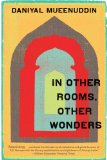Summary | Excerpt | Reading Guide | Reviews | Beyond the Book | Readalikes | Genres & Themes | Author Bio

“What are you laughing at?”
“Nothing. You look like my uncle, except he was huge and fat and you’re thin. He always blew on his tea and then he sipped it and looked sort of gloomy and important, like you do.”
“Gloomy?” He said it in the funniest way, startled.
I can get him, she thought, and it sent a shiver of happiness through her.
“I’m just joking with you. You’re completely different from my uncle. Is that better?”
He smiled, not as a grown-up does, but like a child, smiling with his eyes and mouth and the wrinkles bitten into his face, cheerfully. She noticed this, and thought, He smiles all over, the same way I do.
“You’re making fun of me. Well go ahead, I’m an old man. It’s time for me to be a fool.”
She thought of disagreeing with him, saying he would never be a fool—but stopped herself. Instead she said, “Well, whatever time it is, I don’t think foolishness wears a watch.”
“You’re full of riddles, little girl.”
“Little girl.” Finishing her tea, she took both her cup and his into the kitchen and washed them carefully. Going out again and walking past him, she said, “Thank you, I feel better for talking to you, Uncle.”
In her room, she sat on the bed cross-legged, closed her eyes, leaned back against the wall, and thought, After all, why not? Why shouldn’t I?
Saleema avoided Rafik during the next few days, watching him, but not presuming on the intimacy of their one conversation. She had never been discreet, so that although she did this almost unconsciously, it suggested to her new possibilities of relation, defined not by constraint—which she understood—but by delicacy. Then fate stepped in to reward her. Every year, at the time of the wheat harvest, K. K. Harouni went for a week to his farm at Dunyapur, on the banks of the Indus. His daughter Begum Kamila that year accompanied him, and therefore Saleema went too.
Early on the morning of the departure the two cars stood in the front of the house, one under the portico, for the sahib and Kamila, and the other for the servants. The drivers polished the cars while they waited, leaning over to clean the windshields, experts. Saleema had tied her clothes in a bag. She had bought a new pair of sandals the day before, and now the red plastic straps were cutting into her feet. When the master came out, leaning on Rafik’s arm, those who were sitting on their haunches stood up sharply. He got into the car, called Shah Sahib the accounts manager over, spoke to him briefly through the lowered window, and then the car pulled away, passed under the alley of ancient flame-of-the-forest trees, and turned out the gate. Everyone relaxed, Shah Sahib lit a cigarette, looked without interest over the scene, and returned to his office.
“Come on, come on, get it done,” Samundar Khan driver said to the gardeners, who were loading provisions into the trunk of the second car.
Hassan sat in the front, wearing a lambskin cap that brushed the roof, Rafik and Saleema in the back, a basket of food on the seat between them. She had never before ridden in a private car. Sitting with her hands on her knees, she looked out the window at the old shops along the Mall, Tollington Market, where Hassan went on his bicycle to buy chickens and meat, then the mausoleum of Datta Sahib.
I suppose people looking in must wonder who I am, she thought.
As they came across the Ravi River bridge she asked if she could open her window, not so much because she wanted to, as to register her presence. Hassan and Samundar Khan were arguing about whether the fish in the river had been getting bigger or smaller in the last few years.
Excerpted from In Other Rooms, Other Wonders by Daniyal Mueenuddin. © 2009 by Daniyal Mueenuddin. Excerpted by permission of W.W.Norton & Company. All rights reserved. No part of this excerpt may be reproduced or reprinted without permission in writing from the publisher.
Your guide toexceptional books
BookBrowse seeks out and recommends the best in contemporary fiction and nonfiction—books that not only engage and entertain but also deepen our understanding of ourselves and the world around us.